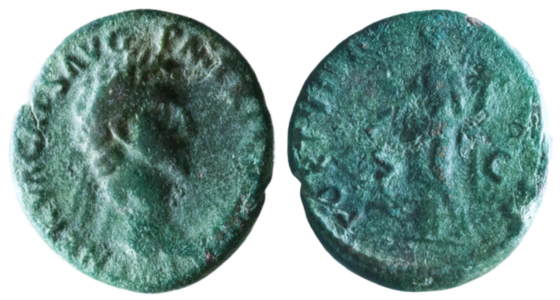
November 8, 2014, by Esther Eidinow
On this day, November 8th, in AD 30, Marcus Cocceius Nerva was born.
As part of the Nottingham Anniversaries through Coins project, Mike Welbourne offers some thoughts on Nerva, Rome’s twelfth emperor, on the anniversary of his birth.
According to Aurelius Victor (Epitome de Caesaribus, 12.1) Nerva was born in the Italian town of Narnia. On his father’s side he came from a family that had been intimately involved in high politics since the 40s BC. For example, his great-grandfather had been an associate of both Marc Antony and Octavian, the future emperor Augustus (Appian, Civil War, 5.60-64), while his grandfather had been a member of the emperor Tiberius’ retinue (Tacitus Annals, 4.58; 6.26).
We are poorly informed about Nerva’s life before he became emperor. Tacitus (Annals, 15.72) mentions that he was praetor-elect in AD 65, the year in which the infamous Pisonian conspiracy was discovered – the plot which aimed to topple the emperor Nero and replace him with the senator Gaius Calpurnius Piso. As a member of the imperial court Nerva seems to have played some unknown but important role in uncovering and crushing the conspiracy, if the extraordinary honours Nero showered on him are any indication: he was given triumphal honours, as well as having a triumphal statue installed in the Forum Romanum and even a portrait bust placed in the imperial palace (Tacitus, Annals, 15.72).
Nerva survived the brief civil war that followed Nero’s fall from power in AD 68, and seems to have managed quickly to ingratiate himself with the new emperor Vespasian, with whom Nerva shared the consulship in AD 71. He was consul for the second time in AD 90 under Vespasian’s successor and younger son Domitian. This was late in Domitian’s reign, in a period when, by all accounts, his reign had descended into tyranny.
The more gruesome vignettes are, of course, probably invention but what lies behind such rhetoric is a genuine deterioration in relations between emperor and aristocracy: a number of prominent members of the senatorial class were banished or executed, and Domitian sought more and more to rule without consulting the senate. Yet in the midst of this increasingly dangerous situation Nerva evidently continued to enjoy imperial favour. Whatever the precise reality of the later years of Domitian’s reign, on 18 September AD 96 the situation at Rome came to a head: he was assassinated in a palace coup and Nerva was acclaimed by the senate as his successor. The speed with which this occurred (he was installed the same day) raises the question of whether Nerva was actually involved in the plot.
According to Cassius Dio (68.1.2-3), Nerva put an end to trials for maiestas (high treason) which had apparently become a feature of Domitian’s reign. These trials were often based on false accusations. Nerva also took steps to deal with what seems to have been some sort of financial crisis and to alleviate to some extent the plight of poor through land grants (Cassius Dio, 68.2.1). Aurelius Victor (Epitome, 12.4) claims that he even arranged to have the children of especially poverty-stricken parents fed at state expense. Despite such good intentions and wise measures, Nerva’s brief stint as emperor was not without its problems. We hear vaguely of a plot by a certain Calpurnius Crassus (Cassius Dio, 68.3.2), but the most notable crisis occurred in AD 97.
It seems Nerva’s predecessor Domitian had been popular with the army, and the soldiery was perhaps the one section of Roman society that reacted badly to his assassination (Suetonius, Life of Domitian, 23.1). Some members of the Praetorian Guard sought to have those involved in the plot executed (Cassius Dio, 68.3.3; Aurelius Victor, Epitome, 12.7-8); Nerva put up some resistance but must have been aware that, like any emperor, to survive he needed the support of the army. He was not a man with a military reputation and to resist too strongly would have alienated the army and jeopardized his position. He relented, and the conspirators were hunted down and killed. To add insult to injury the Guard forced Nerva to offer a public thanksgiving to them for dealing with the conspirators.
The emperor’s response was to adopt as his son (and therefore his successor) a man with a proven record of military experience, who was then governor of one of Rome’s heavily militarized German provinces. This was Marcus Ulpius Traianus, the future emperor Trajan (Cassius Dio, 68.3.4). It is an open question whether Trajan manoeuvred himself into this position, whether he was the choice imposed upon Nerva by the Praetorians, or whether he was selected by Nerva himself as the best candidate. What does seem clear is that Nerva had struggled to obtain the loyalty of the legions, but that his decision to adopt Trajan resolved the crisis.
Nerva continued to rule the Roman Empire until his death at the age of 67. Although his was a short reign, lasting only from 18 September AD 96 to 27 January AD 98, Nerva has generally been regarded as a conscientious and moderate ruler who moved away from Domitian’s determination to rule as a dominus (lord), and back towards ruling as a princeps (first citizen). Nerva has enjoyed such a positive reputation from antiquity onwards that in modern times he is traditionally seen as the first of the so-called ‘Five Good Emperors’, the rest being his immediate successors Trajan, Hadrian, Antoninus Pius, and Marcus Aurelius.
Keep an eye on the Nottingham Classics blog for future anniversaries of other well-known figures and events from the ancient world!
Image: by Kelly Grimshaw.
AE As of Nerva;. Obverse has IMP NERVA CAES AVG P M TR P CO[S II P]P; laureate head right. Reverse has FORTVNA [AVGVST] S C; Fortuna left with rudder and cornucopia. 8.89g, 27mm, 6 o’clock.

Really interesting article, great image, thanks!